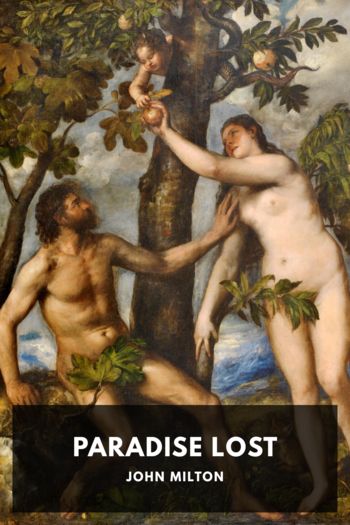Table-Talk by William Hazlitt (best pdf reader for ebooks txt) 📕

- Author: William Hazlitt
Book online «Table-Talk by William Hazlitt (best pdf reader for ebooks txt) 📕». Author William Hazlitt
“Free from the Sirian star and the dread thunder-stroke—”
whose mealy coat no moth can corrupt nor blight can wither. The poet Keats had not this sort of protection for his person—he lay bare to weather—the serpent stung him, and the poison-tree dropped upon this little western flower: when the mercenary servile crew approached him, he had no pedigree to show them, no rent-roll to hold out in reversion for their praise: he was not in any great man’s train, nor the butt and puppet of a lord—he could only offer them “the fairest flowers of the season, carnations and streaked gilliflowers,”—“rue for remembrance and pansies for thoughts,”—they recked not of his gift, but tore him with hideous shouts and laughter,
“Nor could the Muse protect her son!”
Unless an author has all establishment of his own, or is entered on that of some other person, he will hardly be allowed to write English or to spell his own name. To be well spoken of, he must enlist under some standard; he must belong to some coterie. He must get the esprit de corps on his side: he must have literary bail in readiness. Thus they prop up one another’s rickety heads at Murray’s shop, and a spurious reputation, like false argument, runs in a circle. Croker affirms that Gifford is sprightly, and Gifford that Croker is genteel; Disraeli that Jacob is wise, and Jacob that Disraeli is good-natured. A Member of Parliament must be answerable that you are not dangerous or dull before you can be of the entrée. You must commence toad-eater to have your observations attended to; if you are independent, unconnected, you will be regarded as a poor creature. Your opinion is honest, you will say; then ten to one it is not profitable. It is at any rate your own. So much the worse; for then it is not the world’s. Tom Hill is a very tolerable barometer in this respect. He knows nothing, hears everything, and repeats just what he hears; so that you may guess pretty well from this round-faced echo what is said by others! Almost everything goes by presumption and appearances. “Did you not think Mr. B⸺’s language very elegant?”—I thought he bowed very low. “Did you not think him remarkably well-behaved?”—He was unexceptionably dressed. “But were not Mr. C⸺’s manners quite insinuating?”—He said nothing. “You will at least allow his friend to be a well-informed man.”—talked upon all subjects alike. Such would be a pretty faithful interpretation of the tone of what is called “good society.” The surface is everything; we do not pierce to the core. The setting is more valuable than the jewel. Is it not so in other things as well as letters? Is not an R.A. by the supposition a greater man in his profession than anyone who is not so blazoned? Compared with that unrivalled list, Raphael had been illegitimate, Claude not classical, and Michaelangelo admitted by special favour. What is a physician without a diploma? An alderman without being knighted? An actor whose name does not appear in great letters? All others are counterfeits—men “of no mark or likelihood.” This was what made the Jackals of the North so eager to prove that I had been turned out of the Edinburgh Review. It was not the merit of the articles which excited their spleen—but their being there. Of the style they knew nothing; for the thought they cared nothing: all that they knew was that I wrote in that powerful journal, and therefore they asserted that I did not!
We find a class of persons who labour under an obvious natural inaptitude for whatever they aspire to. Their manner of setting about it is a virtual disqualification. The simple affirmation, “What this man has said, I will do,” is not always considered as the proper test of capacity. On the contrary, there are people whose bare pretensions are as good or better than the actual performance of others. What I myself have done, for instance, I never find admitted as proof of what I shall be able to do: whereas I observe others who bring as proof of their competence to any task (and are taken at their word) what they have never done, and who gravely assure those who are inclined to trust them that their talents are exactly fitted for some post because they are just the reverse of what they have ever shown them to be. One man has the air of an editor as much as another has that of a butler or porter in a gentleman’s family. ⸻ is the model of this character, with a prodigious look of business, an air of suspicion which passes for sagacity, and an air of deliberation which passes for judgment. If his own talents are no ways prominent, it is inferred he will be more impartial and in earnest in making use of those of





Comments (0)